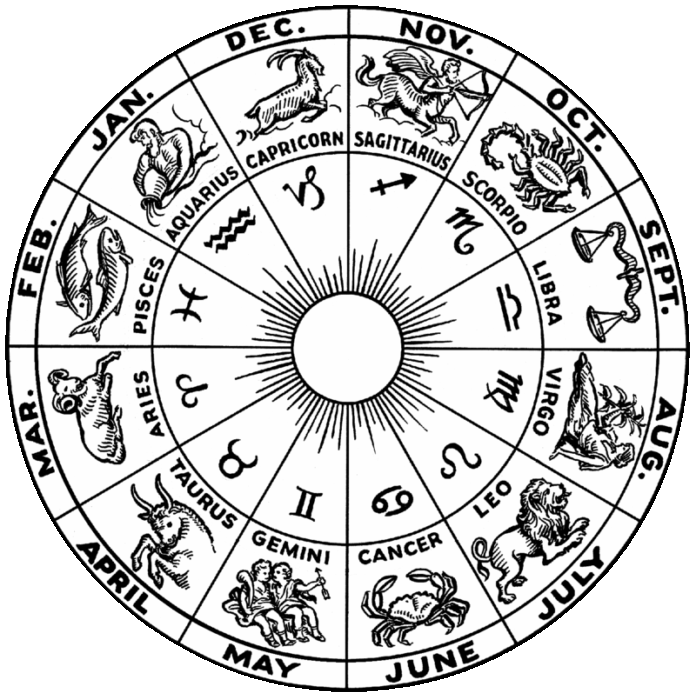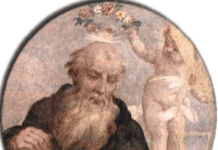Astrology today is a $3 billion dollar online industry. According to one source, 95% of Americans know their astrological sign and roughly 70% of millennials turn to astrology seeking guidance and reassurance in times of trouble.
Astrology is one of the oldest methods of human reckoning. It is associated with prehistoric religions that were based on the worship of stars and planets. The first astrologers predated the first legitimate astronomers, who no doubt were inspired by the importance of astrology as a science governing human destiny. The early astrologers devised a system for predicting the course of a human’s life by ascertaining the exact year, day, and hour of a person’s birth. From these facts a horoscope (daily predictor) could be devised based on the position of the Sun and the moon at the hour of birth. This horoscope the ancient Babylonian and Egyptian priests used to chart the future of people and nations. To the extent that solar and lunar eclipses became possible as astrology advanced into astronomy, the powers of the pagan priests over kings and peasants became enormous if they were able to predict these eclipses.
But astrology contained within the system a tendency toward fatalism. Sometimes a prediction would come true by accident. If the prediction was properly phrased, it might sooner or later come true as it would have anyway in the natural course of events. But a prediction might also come true as a self-fulfilling prophecy. That is, believing an event would happen, circumstances might be created to assure that the event would happen.
Thus astrology started out as religion, but evolved into fakery on the principle that a sucker is born every minute. Astrologers soon enough learned to predict what paying customers wanted to hear. And of course, based on mathematical odds, some of these predictions would come true, giving rise each generation to a whole new crop of customers eager to have their future told according to the twelve signs of the Zodiac.
The Old Testament Jews for the most part repudiated astrology.
Let your astrologers come forward, those stargazers who make predictions month by month, let them save you from what is coming upon you. Surely they are like stubble; the fire will burn them up. They cannot even save themselves from the power of the flame. (Isaiah 47:13)
At the time Christ lived astrology was very popular in the Roman Empire. The Caesars had come to believe very strongly in it as they saw themselves to be favorites of the gods who might protect or harm them. But the early Christian Fathers condemned the false prophets, and the famous mathematician Aguila Ponticus was expelled from his Christian community for his astrological heresies.
As Christianity spread, so also did the doctrine of free will. Astrologers lost favor in the Empire but never ceased to use their influence toward the persecution of Christians. St. Augustine condemned astrology as a fake science, and so did St. Thomas Aquinas who said: “Accordingly if anyone take observation of the stars in order to foreknow casual or fortuitous future events, or to know with certitude future human actions, his conduct is based on a false and vain opinion; and so the operation of the demon introduces itself therein, wherefore it will be a superstitious and unlawful divination.” Summa Theologica
Let’s hear from William Shakespeare:
This is the excellent foppery of the world, that when we are sick in fortune (often the surfeits of our own behavior) we make guilty of our disasters the sun, the moon, and stars: as if we were villains on necessity; fools by heavenly compulsion; knaves, thieves, and treacherous by spherical predominance; drunkards, liars, and adulterers by an enforced obedience of planetary influence; and all that we are evil in, by a divine thrusting on. An admirable evasion of whoremaster man, to lay his goatish disposition on the charge of a star! (King Lear Act I, scene ii)
The French philosopher Voltaire gave a devastating blow to astrology:
The great misfortune of the astrologers is that the sky has changed since the rules of the art were established. The sun, which at the equinox was in Aries in the time of the Argonauts, is to-day in Taurus; and the astrologers, to the great ill-fortune of their art, to-day attribute to one house of the sun what belongs visibly to another.
The distinguished mathematician David Hilbert put it more forcefully:
If one were to bring ten of the wisest men in the world together and ask them what was the most stupid thing in existence, they would not be able to discover anything so stupid as astrology.
Stellae nos non regunt, sed angeli nos custodiunt.












